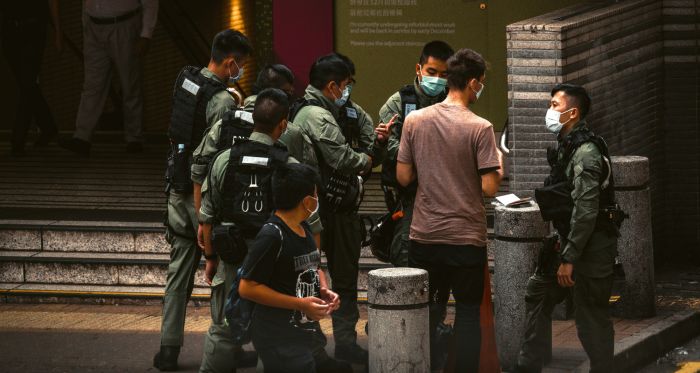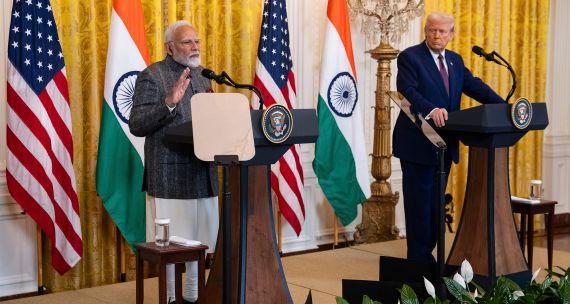Within three months of taking office, U.S. President Donald Trump has given his greatest adversary, Beijing, what it always desired—the dismantling of U.S.-based civil society groups that supported human rights in China. With a stroke of his presidential pen, Donald Trump froze funding for Radio Free Asia, Voice of America, the National Endowment for Democracy, and the Woodrow Wilson International Center, among other smaller human rights NGOs. These institutions had for many decades promoted liberal ideas in China and some encouraged people-to-people exchanges in an emerging cold war between the world’s two superpowers.
From Beijing’s perspective, these U.S. government-funded groups are precisely the troublesome ones that have interfered in China’s internal affairs, from supporting pro-democracy activists to reporting on human rights abuses and fostering independent civil society. The Chinese government long saw these organizations as part of the West’s malign influence operations to destabilize China using the cloak of liberal values and democracy. By starving these groups of funds, President Trump is helping China solve its foreign interference concerns.
The United States’ pull back from its liberal-minded engagements in China also poses an imminent challenge to Canada: how to curb Beijing’s foreign interference without the support of a network of organizations backed by its powerful ally to the south. With the freezing of government funding for organizations that documented and analyzed foreign interference and transnational repression and provided recommendations to democratic governments on how to respond, Canada is the indirect casualty of the Trump administration’s withdrawal from the human rights domain.
Under the previous Biden administration, Canada had a powerful ally in the fight against foreign interference and transnational repression. Following the revelation of China’s so-called “overseas police service centres,” the United States joined Canada and other G7 nations in calling on China to abide by the Vienna Convention on Diplomatic Relations and the Vienna Convention on Consular Relations. In 2023, U.S. prosecutors brought charges against an Indian national for plotting to assassinate a Sikh activist in the U.S., a plot that was part of a larger campaign of targeted killings that included the murder of Hardeep Singh Nijjar in Surrey, British Columbia. The FBI has established a dedicated helpline for people affected by transnational repression, while the RCMP, CSIS, and other Canadian government offices have invited the public to report foreign interference activities by phone or online.
Canada is now confronted with a U.S. government intent on dismantling everything its predecessor built. U.S. Attorney General Pam Bondi cancelled an FBI task force investigating foreign influence activities and scaled back enforcement of the Foreign Agents Registration Act. At the Munich Security Conference in February, Vice President J.D. Vance dismissed the threat of foreign interference and disinformation on European democracies. And President Trump is now cozying up to Russian President Vladimir Putin, a notorious perpetrator of foreign interference and transnational repression.
Instead of focusing its attention on tackling foreign interference, the Trump administration has instead begun to assault its own foreign-born critics. Immigration and Customs Enforcement (ICE) agents have detained and sought to deport and revoke the visas of pro-Palestinian student and faculty activists by citing a Cold War-era Immigration Nationality Act of 1952 containing a provision that authorizes the expulsion of foreigners who are deemed adversarial to the United States’ foreign policy and national security interests. Further, border authorities have denied a French researcher entry to the U.S. because his phone allegedly contained messages criticizing the Trump administration, and Republican legislators have tabled a bill calling for a ban on student visas for Chinese citizens. The same administration has also invoked the 1798 Alien Enemies Act, previously used to detain Japanese Americans during the Second World War, to forcibly transfer more than 250 Venezuelans to a notorious prison in El Salvador without charge. The invocation of obscure provisions in antiquated laws amounts to what legal scholars have called “autocratic legalism”—the use of laws by a democratically elected leader to eliminate a vibrant civil society that can keep them accountable.
Trumpian autocratic legalism means that Canada has not only lost an ally in the fight against foreign interference; it has also gained a new adversary in terms of foreign interference: the United States. Former heads of the Canadian Intelligence Security Service now warn that the U.S. government may use social media to foment unrest in Canada. Fears of U.S. interference in Canadian politics are not unfounded. Elon Musk has repeatedly spoken in favour of the German far-right and anti-immigrant political party Alternative für Deutschland (AfD), including in a video address to the party’s supporters weeks before Germany’s last federal election. Canada may face similar interventions, including appeals to Canadian far-right groups sympathetic to Trump’s calls to annex Canada.
To respond to the threat of foreign interference, Canada must chart a new path with likeminded democracies. Canada can no longer rely on Washington to fund the civil society organizations that for years have pushed back against the world’s autocrats and informed global responses to foreign interference. Instead, Ottawa and others will have to support these groups themselves. Global Affairs Canada’s provision of $1.8 million to support Access Now’s project Counteracting Transnational Repression and Protecting Society in the Digital Age is an applaudable start, but it can do more. Canada should be prepared to provide shelter to non-U.S. citizens targeted by Washington for their political beliefs. Already, an Indian graduate student, wanted by ICE for her participation in pro-Palestinian activism at Columbia, has fled to Canada. She will likely not be the last. Canada should continue to dialogue with fellow democracies like EU member states to exchange lessons learned on how to combat foreign interference.
Ottawa should also continue to lead the way by sharpening its institutional tools and responses to foreign interference. For example, Global Affairs Canada’s Rapid Response Mechanism will continue to play a key role in identifying state-sponsored disinformation campaigns, like those that previously targeted Michael Chong and Chrystia Freeland. Recent work by the Rapid Response Mechanism on a “spamouflage” and doxxing campaign targeting Mandarin Chinese-speaking people in Canada has shone a light on how disinformation feeds online threats. Identifying links between disinformation and transnational repression should be a key part of the Canadian government’s ongoing response to foreign interference.
Finally, Canada should lead by example. It must chart a way to safeguard the civil liberties of diaspora members while targeting foreign interference in a country-agnostic manner. This can be a delicate balance as foreign governments often work through diaspora populations by seeding disinformation and or incentivizing them to help shape policy outcomes in the host country. As part of the Canadian government’s “whole-of-government and whole-of-society” effort to address foreign interference, the Countering Foreign Interference Act (Bill C-70) paves the way for the creation of a public Foreign Influence Transparency Registry. The Registry would require persons or entities acting on behalf of foreign entities to make their activities transparent to the Canadian government. Modelled after the U.S.’ Foreign Agent Registration Act and Australia’s Foreign Influence Transparency Scheme, Canada’s registry is in principle a reasonable tool to counter interference.
However, as robust democracies can also be susceptible to autocratic legalism, Ottawa should pre-emptively build in safeguards such that registries or acts against foreign interference cannot be used as political weapons to silence critics whose views are not aligned with the government or powerful groups in society. Again, Trumpian politics south of the border provide a cautionary tale. Last year, the American Civil Liberties Union warned that members of the U.S. government were seeking to reauthorize Section 702 of the Foreign Intelligence Surveillance Act (FISA) in order “to conduct warrantless searches based on vague and unfounded claims of foreign influence.” Section 702 only authorizes surveillance against foreign individuals who are not on U.S. soil. However, supporters of a reauthorized Section 702 have argued the authority granted by this section could be used to surveil pro-Palestinian protesters supposedly influenced by the Palestinian armed group and political organization Hamas. In 2020, at the height of the Black Lives Matter Protests, the FBI used Section 702 to investigate 133 individuals related to the protests, some of whom were Americans. The U.S. Justice Department under Trump may similarly use the Foreign Agents Registry Act to charge pro-Palestinian protest leaders and organizations as foreign agents.
Such misuse of policy is not an American-only phenomenon. Canadian policymakers and civil society actors must also keep a check on partisan abuse of measures meant to safeguard against foreign interference. One way to do this is for policymakers to distinguish clearly between foreign influence and foreign interference. As we have previously argued, the two concepts lie on a spectrum that varies along coercion and covertness. On the one end of the spectrum lies more benign forms of foreign influence, such as legal and transparent aid, and educational and cultural programs that advance a foreign country’s soft power, such as the Canada-China Scholars' Exchange Program organized in collaboration with the Canadian government. On the other end of the spectrum lies the most coercive forms of foreign interference, such as the Spamouflage disinformation campaign, unauthorized overseas police stations, and transnational repression, both digital and physical.
Ottawa, like any government, cannot be expected to keep a check on itself. The Jeffersonian idea that the price of liberty is eternal vigilance suggests that civil society, as the third sector lying in between the state and the individual, should be such vigilant watchdogs. With Trump’s gutting of the U.S.-based civil society infrastructure protecting human rights and democracy, Canada has an opportunity to absorb the development workers, journalists, researchers, and other professionals who are now cut off by their government. It would be unrealistic to capture all this brain drain; but at the very least, Canada would profit from having its own equivalent of Freedom House, which has been on the frontlines of documenting transnational repression, the most coercive end of foreign interference. As Canada can no longer benefit from the research and watchdog network south of the border, it should continue to foster an ecosystem of its own that both feeds ideas to the policymakers about how to effectively counter foreign interference but also holds power-holders accountable to the misuse and abuse of such laws.
Diana Fu is an associate professor of political science at the University of Toronto’s Munk School of Global Affairs & Public Policy and a 2024-25 John H. McArthur Distinguished Fellow. Emile Dirks is a senior research associate at the University of Toronto’s Citizen Lab.
Main Image Credit: Unsplash






